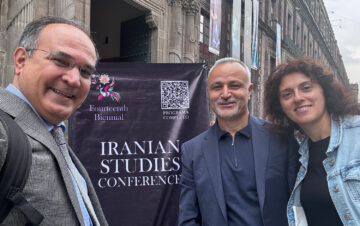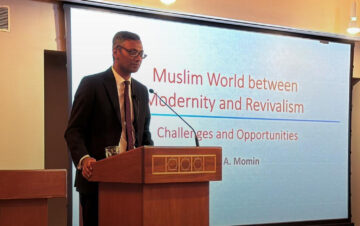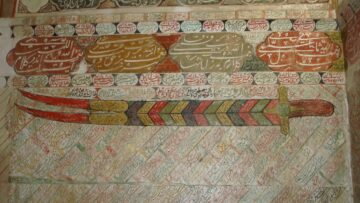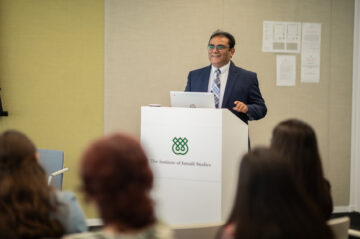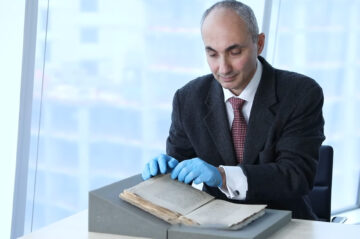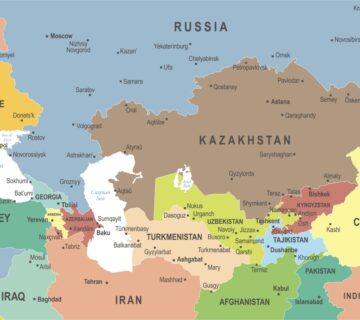The IIS sponsored a panel presentation at the 2010 Middle Eastern Studies Association of North America (MESA) conference held in San Diego, California, USA. The panel entitled, Approaches to Governance in the Fatimid Period, is a continuation of last year’s panel, Formulations of Authority in Early Shi‘i Islam, as part of the Institute’s ongoing endeavour in the field of Shi‘i Studies.
The panel was chaired by Dr Farhad Daftary, co-director of the IIS and organised by Dr Paul E Walker who was the 2001 recipient of the Guggenheim Fellowship to study the life and times of Imam-Caliph al-Hakim. He is currently Deputy Director for Academic Programs at the Center for Middle Eastern Studies, University of Chicago.
When the FatimidsMajor Muslim dynasty of Ismaili caliphs in North Africa (from 909) and later in Egypt (973–1171) More moved from the Maghrib to Egypt, they encountered a subject population of considerably wider diversity, with a large body of Christians (both Melkites and Copts), substantial numbers of Jews, as well as Sunni Muslims, and non-Ismaili Shi‘i Muslims, often belonging to ethnically distinct groupings. The challenge of governing was, moreover, amplified by having a Shi‘i Ismaili line of imams rule over a state in which the most ardent supporters of the dynasty constituted a numerical minority. Yet, in general, the Fatimids succeeded as is evident, in part, by the 250-year length of their rule. Even so, exactly how they negotiated the demands of disparate communities and factions, when and if these groups sought governmental sanctions for this or that issue, needs considerably more study and analysis. The panel dealt with four important aspects of governance in this context.
The first presentation by Maryann Shenoda, Assistant Professor, History and Comparative Literature at Harvard University, in contrast to the ones following it, offered an investigation of Fatimid governance from the perspective of the governed, in this case, the Copts. The paper investigated how they dealt with their overlords and a government that did not necessarily act in their interests. Dr Shenoda also tried to show when and under what circumstances the Copts approached the Fatimid rulers in matters affecting their internal affairs.
The second paper was presented by Dr Delia Cortese, Lecturer in Religious and Islamic Studies at Middlesex University, retracing the way in which Sunni learning continued to be transmitted in Fatimid Egypt beyond the Ismaili religious and legal stances endorsed by the regime. In particular, she provided a contextualised analysis of the factors that made Fatimid Egypt a lively centre for hadith scholarship and Qur’an recitation training, questioning the existence of clear-cut sectarian boundaries between Shi‘is and Sunnis when it came to sharing or benefitting from learning. The period of Fatimid history under consideration spanned the reigns of Imam-caliphs al-Mu‘izz to that of al-Hakim.
The third presentation was made by Dr Shainool Jiwa, a specialist in Fatimid history and Head of the Department of Community Relations at The Institute of Ismaili Studies, who looked at the initial phase of Fatimid rule in Egypt, an era noted for inclusiveness under the reign of Imam-caliph al-‘Aziz billah. Not entirely without difficulties and occasional conflict, the decades of this imam-caliph were nonetheless regarded as an exemplary period for the participation of a wide range of groups, including Christians and Jews, in his government. Dr Jiwa examined how the Fatimid sovereign negotiated the execution of his authority and leadership such that he was able to balance the interests of the varied religious and ethnic groups to coalesce with the effective governance of the Fatimid state.
The fourth and final presentation was made by Dr Paul E Walker who presented an account of the end of Imam-caliph al-Hakim’s reign when there existed at first an exclusionary policy aimed at various dhimmi (protected) communities followed by a striking reversal and possibly a restoration of Imam-caliph al-‘Aziz’s benevolent inclusion. Its purpose was to explain exactly what transpired, when and in what order, and what this episode elucidates about Fatimid governance of its non-Muslim subjects in general.
MESA book exhibit:
IIS publications were on display as part of the popular MESA book exhibit, located adjacent to the main MESA conference hall. Patricia Salazar (editor) and Julia Kolb (PA to Dr. Farhad Daftary) from the Department of Academic Research and Publications, were there to distribute catalogues and provide information about the books and the work of the Institute to academics, authors, publishers, students, researchers and other conference attendees.

